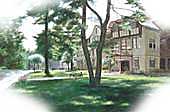Winter
1984
Behold God is My Salvation
Nancy Otis
Pinecrest Student
David found himself in many circumstances that caused him
to cry to God for help. Many of the Psalms were written during
the troubled periods of his life. We find him continually
running and hiding from Saul, who was out to destroy him because
he knew if he didn’t, David would be the next king,
and his own house would be forsaken. Yet, David was never
on the offensive; though he had many an opportunity to kill
Saul, he refrained because he perceived that Saul was presently
God’s anointed. David’s problem then was not one
of conquering, but one of staying alive, preserving his life
. . . he trusted in God to take vengeance upon his enemy.
So, he was clearly in a position where he could not use his
strength to prevail, he had to throw himself upon the mercy
of God, which is what he did.
Therefore, we see in the Psalms that time and time again
David gives glory to God for overcoming for him; he never
ascribes strength to himself, but God. The following Psalm
David spoke to the Lord the day He delivered him from Saul.
“I will love thee, O Lord, my strength. The Lord is
my rock, and my fortress, and my deliverer; my God, my strength,
in whom I will trust; my buckler and the horn of my salvation,
and my high tower. I will call upon the Lord, who is worthy
to be praised: so shall I be saved from mine enemies. The
Lord liveth; and blessed be my rock; and let the God of my
salvation be exalted. It is God that avengeth me, and subdueth
the people under me.” Psalm 18:1-3, 46-47
God delivered him because he acknowledged his own weakness
and fallibility and believed and trusted in God’s mercy
and strength. Instead of allowing the adversities to make
him bitter, David learned the secret of crying out to God.
He never blamed God, only looked to Him for a way out. And
in spite of the many dangers he faced at times, he never feared
them, but he feared God.
This Salvation of God, which David cried out for, this Mighty
Deliverer from all his foes, this place of hiding and shelter
from all harm, this Shepherd that led him through the valley
of the shadow of death . . . was the Lord Jesus Christ. He
was God’s grace and mercy revealed to David’s
heart in the most desperate of situations. Like Jacob, in
crisis, he grasped hold of God.
What a rational thing to do, and yet something most of us
fail at!
As stated before, David never tried to overcome in his own
strength, but let God battle for him. This is significant.
Rather than fighting, we see him always on the defensive,
running (yet not in fear), and hiding from Saul. His battle
then, consisted of remaining hid and secluded! What was he
saying in his heart to God while in hiding? He begins to call
God his fortress, his high tower, his refuge. He cries: “.
. . hide me under the shadow of thy wings . . .” (Psalm
17:8) and declares boldly: “For in the time of trouble
he shall hide me; he shall set me upon a rock” (Psalm
27:5). Perhaps most beautiful of all, he prays: “. .
. lead me to the rock that is higher than I. For thou hast
been a shelter for me, and a strong tower from the enemy.
I will abide in thy tabernacle for ever: I will trust in the
covert of thy wings” (Psalm 61:2-4).
What did Saul and the other enemies represent in David’s
life, and what might they represent in our own lives? There
is another situation in which David finds shelter in God and
calls Him his hiding place and deliverer. But here, he is
not found running from Saul, but from something in his own
life. Here in Psalm 32, it is sin that drove him into the
arms of God. And here, God reveals to David His same nature
in the face of this battle, as He had in the others: “For
this shall every one that is godly pray unto thee in a time
when thou mayest be found: surely in the floods of great waters
they shall not come nigh unto him. Thou art my hiding place;
thou shall preserve me from trouble; thou shalt compass me
about with songs of deliverance” (vs. 6-7). In verse
10 we read:’ “. . . mercy shall compass him about.”
What mercy! What a revelation that must have been to David.
Until now, the battles in which he suffered, and in which
God delivered him, had never been his fault – he was
clearly in the right. Now we see him miserably wrong and yet
because he cried to God, he was heard, and vengeance was taken
upon this enemy also. Concerning the same sin he cried in
Psalm 51:14 “Deliver me from bloodguiltiness, O God,
thou God of my salvation . . .” Once again, David finds
a hiding place in Him.
This leaves a pattern for us to follow. There are areas in
our lives, sins, that always seem to be on our trail, wanting
to overcome and consume us. There seems yet to be with us
that nature that opposes itself against the new creation life
in us. Sin would utterly destroy us and usurp the calling
to rulership that God has given to us though the Lord Jesus
Christ. We can only win in the same manner that David did:
not by our own strength, for by strength shall no man prevail
(1 Samuel 2:9), but by looking steadfastly to the Rock of
our salvation, to Jesus Christ who has already conquered all
upon the cross. We must learn to run to Him regardless of
what we’re faced with, that we might find in Him what
He was to the Psalmist: a hiding place, a refuge from trouble,
and know for ourselves the free and flowing mercy of our God
and Savior the Lord Jesus Christ.


